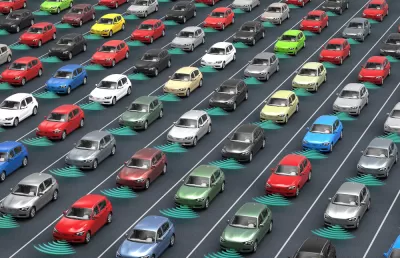Self-driving cars are likely to become part of the urban landscape in the future, and they have the potential to drastically alter urban environments—in good and bad ways.

"Unless cities pay close attention to how self-driving cars will shape their futures, experts say, they could easily repeat, and exacerbate, mistakes of the past," writes Katherine Shaver.
Widespread use of autonomous vehicles will not happen, realistically, for at least a couple decades, say experts. But planners, designers, and architects are thinking ahead to how the new technology could change land use and travel patterns, says Shaver.
"For example, because driverless vehicles will drop off passengers and move on, prime real estate now consumed by vast parking lots and unsightly garages could be freed up for more housing, parks, public plazas and open space, planners say," writes Shaver. In addition, streets would open up, making room for bike lanes and wider sidewalks.
Still, many questions remain about the long-term impacts of self-driving vehicles, with some predictions suggesting that they will not solve the parking, housing, and transportation problems of cities. If these vehicles make car travel easier, people might travel more, eschew transit, and decide to live farther out, with the result being increased sprawl.
"Even so, some planners are considering ways that governments could discourage such behavior, for example, via a per-mile tax to make driverless vehicle passengers feel and bear the costs of longer trips. Such a tax, supporters say, also might discourage empty vehicles from adding to traffic congestion by roaming streets in search of passengers," notes Shaver.
FULL STORY: City planners eye self-driving vehicles to correct mistakes of the 20th-century auto

Planetizen Federal Action Tracker
A weekly monitor of how Trump’s orders and actions are impacting planners and planning in America.

Congressman Proposes Bill to Rename DC Metro “Trump Train”
The Make Autorail Great Again Act would withhold federal funding to the system until the Washington Metropolitan Area Transit Authority (WMATA), rebrands as the Washington Metropolitan Authority for Greater Access (WMAGA).

The Simple Legislative Tool Transforming Vacant Downtowns
In California, Michigan and Georgia, an easy win is bringing dollars — and delight — back to city centers.

The States Losing Rural Delivery Rooms at an Alarming Pace
In some states, as few as 9% of rural hospitals still deliver babies. As a result, rising pre-term births, no adequate pre-term care and harrowing close calls are a growing reality.

The Small South Asian Republic Going all in on EVs
Thanks to one simple policy change less than five years ago, 65% of new cars in this Himalayan country are now electric.

DC Backpedals on Bike Lane Protection, Swaps Barriers for Paint
Citing aesthetic concerns, the city is removing the concrete barriers and flexposts that once separated Arizona Avenue cyclists from motor vehicles.
Urban Design for Planners 1: Software Tools
This six-course series explores essential urban design concepts using open source software and equips planners with the tools they need to participate fully in the urban design process.
Planning for Universal Design
Learn the tools for implementing Universal Design in planning regulations.
Smith Gee Studio
City of Charlotte
City of Camden Redevelopment Agency
City of Astoria
Transportation Research & Education Center (TREC) at Portland State University
US High Speed Rail Association
City of Camden Redevelopment Agency
Municipality of Princeton (NJ)





























